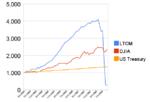Refer to my post about sampled optimisation.
Refer to my numerous posts about JP Morgan's FX unit. E-mail them and explain your points because our little forex world sure can't afford the collapse of such a liquidity provider. You need to save them asap. They need saving.
Refer to the job page of this Hedge fund that trades only automated DIRECTIONAL systems and has done for 20 years. Their profit participation is almost 40% since their return is so crazy good compared to the market average.
https://www.renfund.com/vm/jobs.vm - e-mail them and tell them they've got the whole thing wrong and they should employ you instead.
Do you have any
actual experience with advanced automated systems (not EAs or equivalent)? Can you really put your hand on heart and claim to know what you're talking about and that your statement is EMPIRICAL fact?
Why make such statements... why...
It's like me saying manual traders won't stay profitable in the long run because I can quote the miserable declines of numerous big names throughout history (including Livermore...). It's not a factual statement however so I wouldn't make it..
F**k sake.

